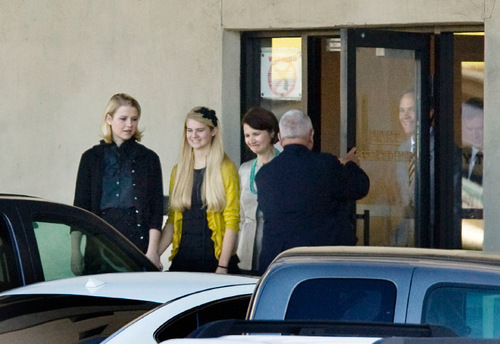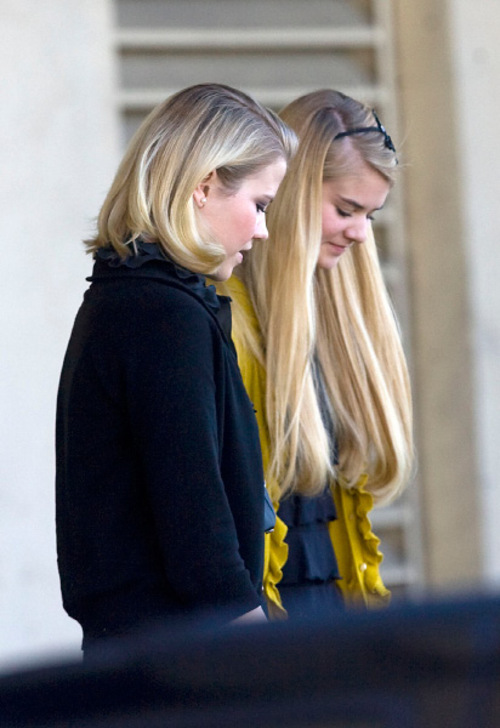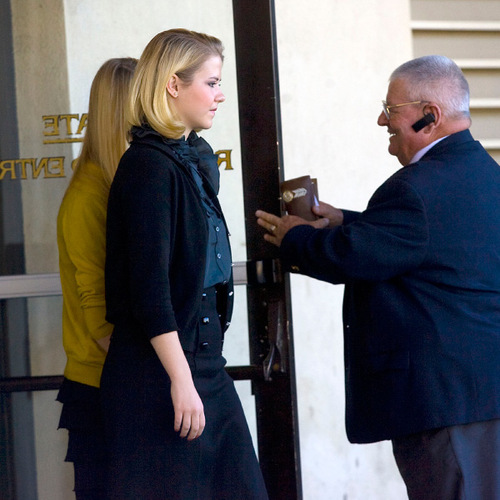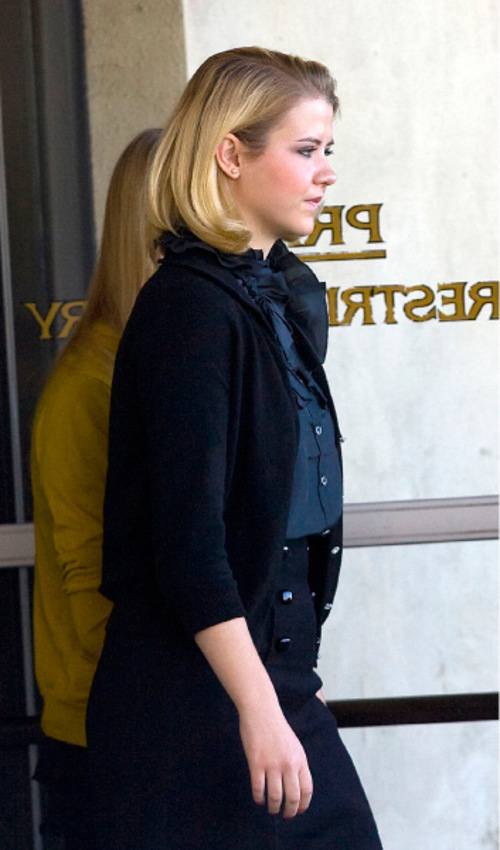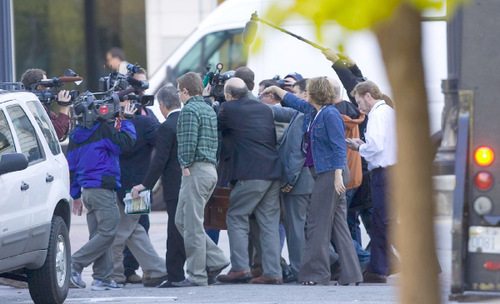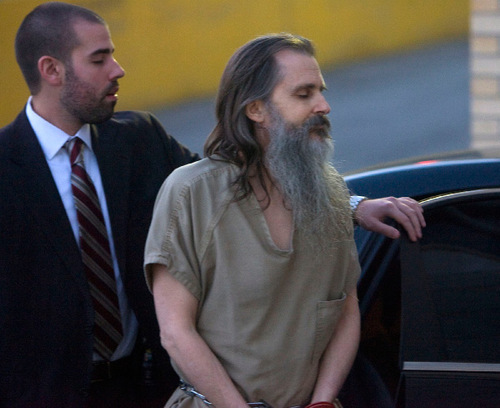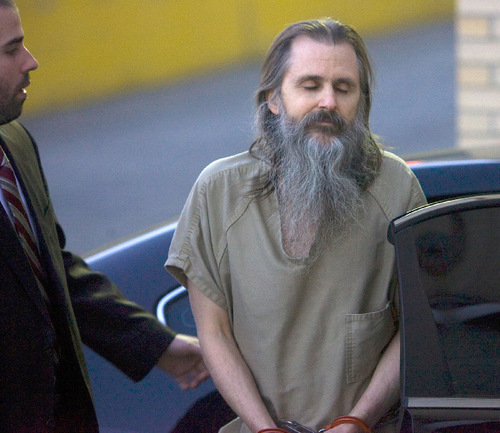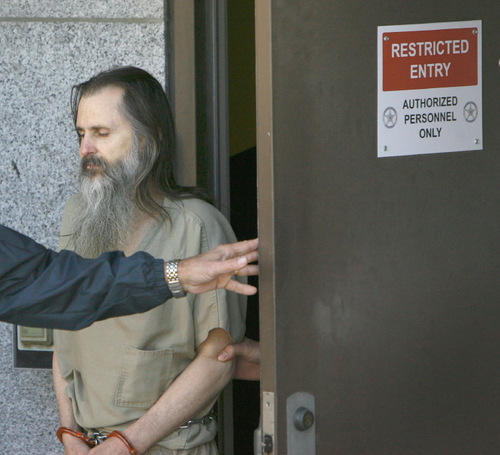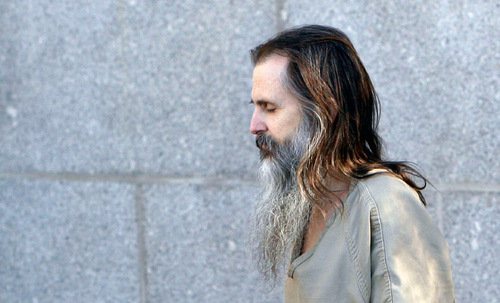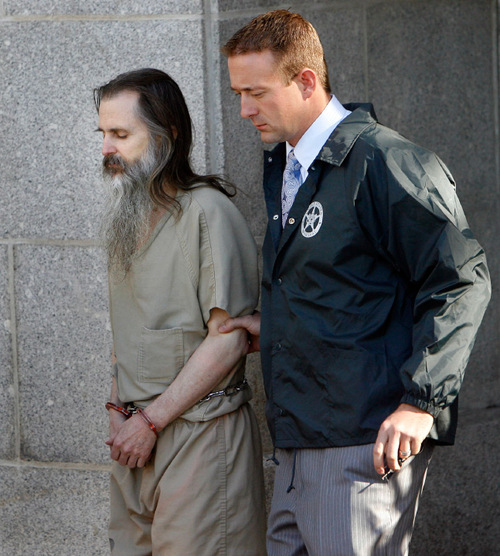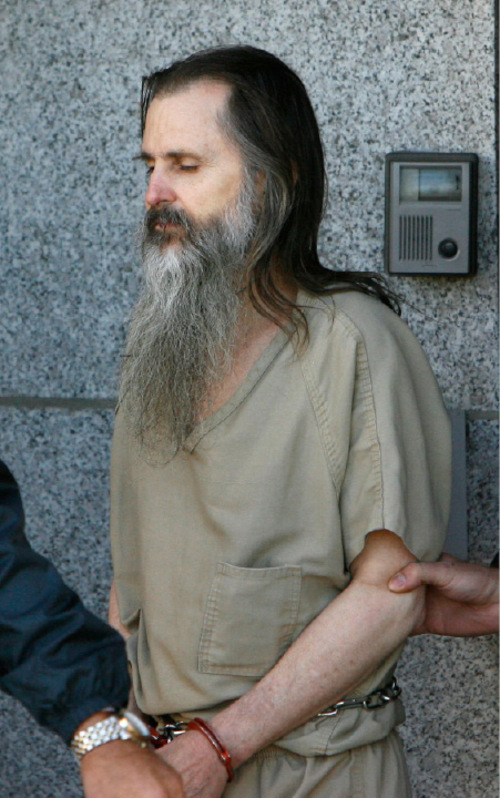This is an archived article that was published on sltrib.com in 2010, and information in the article may be outdated. It is provided only for personal research purposes and may not be reprinted.
Opening arguments began Thursday in the trial of Mitchell, who is accused of kidnapping and sexually abusing Elizabeth Smart in 2002.
The Tribune is providing, as accurately as possible, an account of the proceedings from today.
The testimony below is not intended to be a court transcript, but is meant to give the public insight into one of the state's most high-profile trials.
Assistant U.S. Attorney Felice Viti opened the prosecution's case with his opening statements.
• Please, the court, Mr. [Robert] Steel, counsel.
In the evening hours, Ed and Lois Smart engaged in a nightly ritual engaged the world over: They went through the evening ritual of putting their children to bed. Six children — four girls, two boys. The oldest children, Elizabeth and Mary Katherine, were 14 and 9 years old respectively.
That evening, they thought their children were safely where supposed to be, another busy day was ending, and in a few short hours another busy day was going to be.
They never imagined how short that time would be, never imagined how their world would change in the early morning hours of June 5, 2002, when Mary Katherine awakened Ed and Lois and told them the unthinkable: A man had taken Elizabeth.
June 4, 2002, was the last time they'd see their daughter until March 12, 2003, nine long, agonizing months. On June 5, 2002, Elizabeth Smart was awakened from her sleep and forced into a nine-month nightmare, taken from her own home, her own bed by the defendant, Brian David Mitchell. For the next nine months was held captive, forced to engage in conduct so contrary to what she knew, conduct that flew in the face of all she had learned, all she had been taught, all she believed. She was threatened, sexually abused, degraded and humiliated.
She spent six weeks tethered to two trees. The defendant and his wife took Elizabeth from Utah to Lakeside, Calif., a town 30 miles northeast of San Diego. While their location changed, their conduct did not. Within 24 hours, she was sexually abused. The sexual abuse, the degradation, the humiliation continued.
In March, the three left San Diego. March 12 she was found right her in the streets of Sandy, Utah.
You will be asked whether the United States has proven the allegations in the indictment.
[Viti then read the indictment.]
You will base your verdict on evidence that will be presented in this trial, the testimony of witnesses, physical evidence, photographs and stipulations that are merely agreements between the United States and the defense counsel.
You will of course hear from Elizabeth Smart. She will recount her nine-month ordeal in [excrutiating] detail. June 4, 2002, was special for her. She was going to, in a short while, graduate from junior high school. That night was an awards ceremony. She was supposed to perform for the awards ceremony. She and her sister Mary Katherine went for a jog and she went to her awards ceremony. Because she was late, she was unable to perform, but she received her awards and returned home, said a family prayer, read to Mary Katherine and fell asleep about 1 or 1:30 in the morning.
Shortly thereafter, she was awakened by the defendant holding a knife to her throat, threatening to kill her and her family if she cried out, forced into a closet to take shoes, shoes sturdy enough to take a climb through the house, backyard, neighbors' yard and across first street to a trailhead. Throughout this time, while pointing a knife at her, threatening to kill her and her family.
The defendant forced her up the trail and then to a dry streambed, which they followed until they came to the campsite, which was to be her prison for the next four months. When they entered the campsite, Wanda Barzee was waiting for them. Elizabeth was taken inside a tent. She was forced to remove her red pajamas and underwear and to don a robe. The defendant entered the tent and performed what he claimed to be a marriage ceremony.
He raped her.
Elizabeth, in tears, fell asleep in the tent. When she awoke, the defendant secured one end of a cable around her ankle and the other to two trees that were situated a distance from one another. After she was tethered, she told the defendant she needed to go to the bathroom. He pointed to a bucket just outside the perimeter of the campsite. He had carefully calibrated the cable system so it was just inside her range. When she first went to the bathroom, she noticed she was bleeding.
In those first days at the camp, she decided on a survival strategy. A plan she was could carefully execute in order to be with her family again. She decided she would outlive the defendant. ... She would not act contrary to his wishes and his desires. For the next six weeks or so, the once limitless horizons of Elizabeth's world went no further than the length of that cable. At times, she was released from the cable to perform chores such as fetching water and washing clothes. But the cable around her ankle was never removed. She was forced to either drag it or carry it. In the first few weeks, she was forced to sleep in a tent with the defendant and Wanda, still tethered to the cable.
After about six weeks in captivity, after constant reminders and threats about what he would do to her and her family if she tried to escape, he removed the cable from her ankle. She was now physically untethered but certainly not free. The defendant had decided Elizabeth could travel with him and Wanda to Salt Lake City. She was forced to wear a robe and a veil. The only exposed feature was her eyes. The defendant wanted her hidden from the world. He threatened that if she ever cried out, he ... the man who had succeeded in taking her from her bed and her own home ... he would kill her or her family. Elizabeth had no alternative but to believe him, no choice but to comply.
During their trips to Salt Lake, Elizabeth came into contact with people who were curious about the three, especially the young female behind that veil. One of those encounters occurred at the Salt Lake City library with a Salt Lake City homicide detective. He was there investing wether the young girl might be Elizabeth Smart. He demanded the defendant allow the girl to remove the veil. He said it would be highly inappropriate for religious reasons to look at her face. Elizabeth waited silently, hoping the detective would look at her face, recognize her and end her ordeal. But the detective left without looking and her hopes went unrealized for that day.
This was the last time the defendant allowed her to travel to Salt Lake until they left for California. This close encounter accelerated the defendant's plan to travel to California.
Once the defendant obtained enough money to purchase bus tickets, they would leave.
Elizabeth will describe in more detail what happened at the upper camp, right here in Utah. She was sexually abused on a daily basis, and watched the defendant and Wanda have sex with one another. She was forced to drink alcohol, smoke cigarettes and marijuana. She was forced to walk around naked at the campsite. The defendant also attempted to strip Elizabeth of her identity and to destroy any connection to her past.
He renamed her Shirdashi and then allowed her to chose the name Esther. She was forced to call her parents Lois and Ed, and call Wanda and the defendant mom and dad.
On or about Oct. 7, 2002, the defendant and Wanda forced her onto a Greyhound bus bound for San Diego. She once again was covered head to toe in robes, a headdress and face veil. The veil was a bit different, the defendant had learned a lesson from that close encounter in the Salt Lake library. This time, those eyes, those piercing blue eyes, were covered by sheer fabric. Those eyes were the only features exposed to the world, and almost led to her recovery. The defendant made sure no one would ever see those eyes again.
The defendant made sure she would be totally encased in cloth. Wanda was dressed the same way, so the reason he gave why they were covered so they wouldn't have to answer questions about why the young female was covered while the older female was not.
A place that attracted many homeless people, transient-type people, a campsite in a dry river bed in the outskirts of Riverside. Within 24 hours, he raped Elizabeth. While their location changed, their conduct did not. She was sexually abused, degraded, humiliated, forced to view pornography and subjected to daily harangue, never allowed to speak, never left alone. In February, because of near intrusion by strangers, the defendant moved camp from the dry river bed to a more remote secure location in the hills above Riverside. They never went back into town until they made the trip back to Utah.
At some point in California, something happened that heightened the fear of discovery. She convinced them of hitching back, convinced it would be better. On the 3rd of March, they began the trip back wearing regular clothes. She was not wearing the robes, veil and headdress. The defendant had decided at Elizabeth's suggestion that they hitchhike back, but that the chances of being offered a ride were better if not dressed in their robes. But they still had to hide her blonde hair and blue eyes, Elizabeth's two most striking features.
They forced her to wear a wig and sunglasses, created a cover story for her. She was no longer Shirdashi or Esther, but Augustine Marshall, daughter from a previous marriage visiting from Florida to spend some time preaching and ministering. He was no longer Brian David Mitchell, Emmanuel, Michael Jensen or any other aliases, for this trip he would be Peter Marshall.
In early March, they began to hitchhike their way from California to Nevada to Utah. On March 12, they got what Elizabeth had wished for, hoped for and prayed for: The defendant was recognized as Brian David Mitchell, and this time the defendant couldn't talk his way out of it, and Elizabeth's nightmare finally ended on that day.
Of course you will hear from other witnesses, those who encountered them in Utah and California and Nevada, share their experiences with you, tell you what happened, tell you more than what happened. Please pay very close attention to how they felt during this nine-month period. They have great insight into who and what the defendant was. As you listen to Elizabeth, pay very close attention to how he would manipulate people he met, especially through religion, and blessings to assuage anger at Elizabeth from Wanda.
Listen to others about how he used religion, whether it was to get money, whether it was for food, a place to sleep or to prevent an experienced detective from looking under her veil.
You will hear from that detective. You will learn how the defendant used religion in a very different way than when he was with Wanda and Elizabeth to attempt to convince the detective he should not look under that veil. On this occasion there would be no talk of blessing or revelation. ... He needed to prevent the detective from looking, so he adapted his use of religion for the audience to solve a particular problem in front of him.
You will hear from others about similar conduct.
Elizabeth will also describe to you just how careful, deliberate and methodical the defendant was in the preparation not only of her kidnapping, but other different and dangerous tasks he set out to accomplish. Listen carefully to the description of the precautions he used to escape detection. These were premeditated steps, such as the different routes he would us to travel to the upper campsite so that a well-worn path was not created.
Or while in California that the three of them ... had to change into regular clothes from their robes before they moved from that lower camp in California to that upper camp. So that anybody who might have spotted them could not connect the people in the robes to them.
You will hear, and this time even see, how the defendant was able to nimbly extricate himself from very difficult situations. For example, the defendant using the alias Michael Jensen was able to very calmly and coolly convince a California judge that he wasn't nothing but a preacher who had been sober for several years and had just recently fell off the wagon ... the judge, based on the defendant's well-crafted story, reacted favorably to him.
You will see how the defendant conducted himself during an investigation by an FBI agent in Salt Lake City subsequent to his arrest on March 12, 2003. During the playing of this video tape interview, watch how the defendant very coolly, calmly, confidently responds to questions in very evasive and clever ways. ... It will show you how well he understood and mentally processed them and how acutely aware he was of the potential ramifications of his responses. ...
He did this all in the blink of an eye for a very, very long period when he was confronted by two law enforcement officers. Watch for the point in the video when one of the officers gets up and touches the defendant and how he instantly turns that into his advantage.
The defendant was interviewed on four specific incidents by another agent. Listen to this experienced agent's testimony as he recounts the defendant's calculated actions.
This will provide you some insight into who and what the defendant was during that nine-month period.
Elizabeth will recount what the defendant did to her. She will describe who and what the defendant was. She will also describe the decisions she made during her months in captivity. When you evaluate these decisions, do so with out forgetting what she will tell you about June 4 and 5, just how abruptly, traumatically and violently her life changed within hours. Remember what she will tell you about those last experiences she shared with her family on the evening of June 4. She had jogged with her sister. She attended her junior high award ceremony. She said family prayers. She went to bedroom and read to her little sister before falling asleep by her sister's side.
Then compare those last experiences with what she will tell you about her first experience with the defendant on June 5. How without warning the defendant woke her from her sleep in her own bedroom and under the threat of death he took her from her family at knifepoint from up under the bedding under which she was sleeping, from her loving family and forced to a remote campsite, where she was ordered to strip, was told she was married to a man she didn't know, raped and tied between two trees ... and told that this was her new life. That tent was her new home. That bucket her new bathroom.
And yet despite this, shortly after that change, she made the only free choice she would make throughout those nine months: She chose to survive so one day she would be reunited with that loving family. She will tell you that every decision she made was carried out so he wouldn't carry out those threats to kill her family and those who would help her.
Nothing she did was voluntary. Everything she did was to survive.
When you listen to evidence of her contact, filter it through prism of survival. It worked, she survived. During these next few weeks, you will be hearing and seeing all the evidence needed to reach the verdict. Some will be disturbing. Please keep in mind neither the government nor the defense, by electing to use such evidence is not doing so gratuitously. It is not our intention to humiliate or embarrass anyone. We do it to provide all the evidence needed for you to reach a verdict.
Please keep your focus. Pay close attention to the evidence and testimony, and as Judge Kimball instructed, please keep an open mind. At the end of the evidence, we will speak to you once more. We'll be asking you to return a verdict consist with your oath and responsibility of jurors. The United States will be asking you to return a verdict of guilty.
[Parker Douglas then presented the defense's opening statement.]
The government has just given you a snapshot, a close-up if you will, of some of what you may have heard before from November 2002 to March 2003. The story you have heard is horrifying, terrifying, especially to those of us who are parents.
As Mr. Viti said, none of us are putting this evidence out gratuitously, some of what you've heard may pale in comparison to what you'll hear. No one could hear what you've just heard and not be affected. It's horrifying, period. Whether someone who takes such action is ultimately forgivable, I can't answer that question. I don't know, and I don't know how I'd know, but that's not the question we have to answer.
Whether it's deserved or merited, we are here to understand what happened and why. Forgiveness is not for a court of law to provide. Some of us believe that forgiveness belongs with the person who was hurt or wronged; the creator, if we believe in one; or that forgiveness is not possible. It's the president who has the ability to give forgiveness in the form of a pardon. Courts are about justice, here to determine a just result in the facts you are asked to evaluate. In our criminal justice system, those ...
Judge Kimball: Sidebar with counsel and recorder.
[The attorneys and judge have a discussion in private.]
Kimball: Ladies and gentleman of the jury, a legal issue has arisen. We need to excuse you now, not from services on this jury. We will tell you when to come back. It is very important not to read or listen to anything when you come back, which will not be before next week. We'll let you know, and we're sorry about this.


